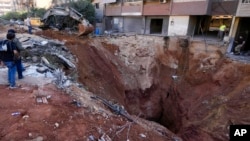
A series of high-profile assassinations carried out by Israel against the Lebanese militant group Hezbollah in recent weeks has significantly weakened its leadership structure, analysts say.
An Israeli attack killed Hezbollah leader Hassan Nasrallah in Beirut on September 27. Days after that, Israel carried out more airstrikes on Hezbollah’s stronghold in Beirut’s southern suburbs. Israeli Prime Minister Benjamin Netanyahu said Tuesday the Israeli strikes killed Nasrallah’s presumed successor, Hashem Safieddine, even though Hezbollah itself has not confirmed his death.
Since the latest escalation between Israel and Hezbollah, Israeli strikes in Lebanon have killed at least 25 senior commanders of the Shiite group, according to Israeli officials.
The absence of these people is evident in Hezbollah’s performance, according to Hussain Abdul Hussain, a research fellow at the Washington-based Foundation for Defense of Democracies, who said the militia “looks headless.”
“Now it still looks operational in the south, but that’s only because Hezbollah designed itself in such a way that if one part is severed, the other parts would continue to operate independently,” he told VOA. “This is good at an operational level, but bad on strategic level.”
Hezbollah leaders claim the group’s capabilities “are fine.” In a televised speech on Tuesday, Hezbollah deputy leader Naim Qassem said Hezbollah’s command and control were intact, and so was its organizational structure.
“We have overcome the blows that hit us, and we have put alternatives for all positions,” he said in his remarks in Arabic, adding that for each newly filled position, a deputy has been assigned.
Qassem said that Hezbollah’s continued rocket attacks on Israel showed a high level of coordination between the group’s leadership and its units.
Israeli officials said Hezbollah fired more than 100 rockets at Israel on Sunday, including several at the northern port city of Haifa. At least five people in Haifa were wounded in the attack.
But analyst Abdul Hussain told VOA via WhatsApp that firing projectiles on Israel was not an indicator of any capabilities, noting that Hezbollah and the Palestinian militant group Hamas are just trying to show they have not been defeated.
“What Hamas does is that every few weeks, it launches at least one or more rockets on Israel to prove that it still has a pulse,” he said. “This does not mean Hamas maintains its control-and-command military structure. The same applies to Hezbollah.”
Hussain added that Hezbollah’s command was centralized, but at times of war, its cells of rocket launchers have a license to act independently when the command is taken down.
Iran’s intervention
Ali al-Amin, a Beirut-based analyst and editor-in-chief of the Janoubia News site, said that what keeps Hezbollah’s military and political structure together and prevents it from further deterioration is a direct intervention by Iran, its main backer.
“Iran no longer believes that Hezbollah is able to manage the confrontation with Israel alone,” he told VOA. “Officials from Iran’s Revolutionary Guard Corps were already here, but more officials and units came to Lebanon after the war erupted to fill the leadership void and reset the structure within [Hezbollah] units on the ground.”
Al-Amin said that Hezbollah is not functioning by its own dynamism as when Nasrallah was alive, noting “the absence of Nasrallah itself has created a major confusion within Hezbollah’s institutions, and Iran wants [to] end confusion by managing the command.”
Qassem, Hezbollah’s deputy general secretary, said in his remarks Tuesday that a new leader for the group will be selected, without setting a specific date.
Given the number of top leaders who were killed in recent Israeli strikes, though, analysts say they doubt a new militant leader will be appointed anytime soon.
“There are no longer figures within Hezbollah that could be compared with Nasrallah, or even with Safieddine,” analyst al-Amin said. “Therefore, I believe that appointing a new secretary general for Hezbollah would take a while.”
“If Hezbollah survived this war and reached a settlement, it could appoint a civilian leader in the next phase,” he said.
This story originated in VOA’s Kurdish Service.








